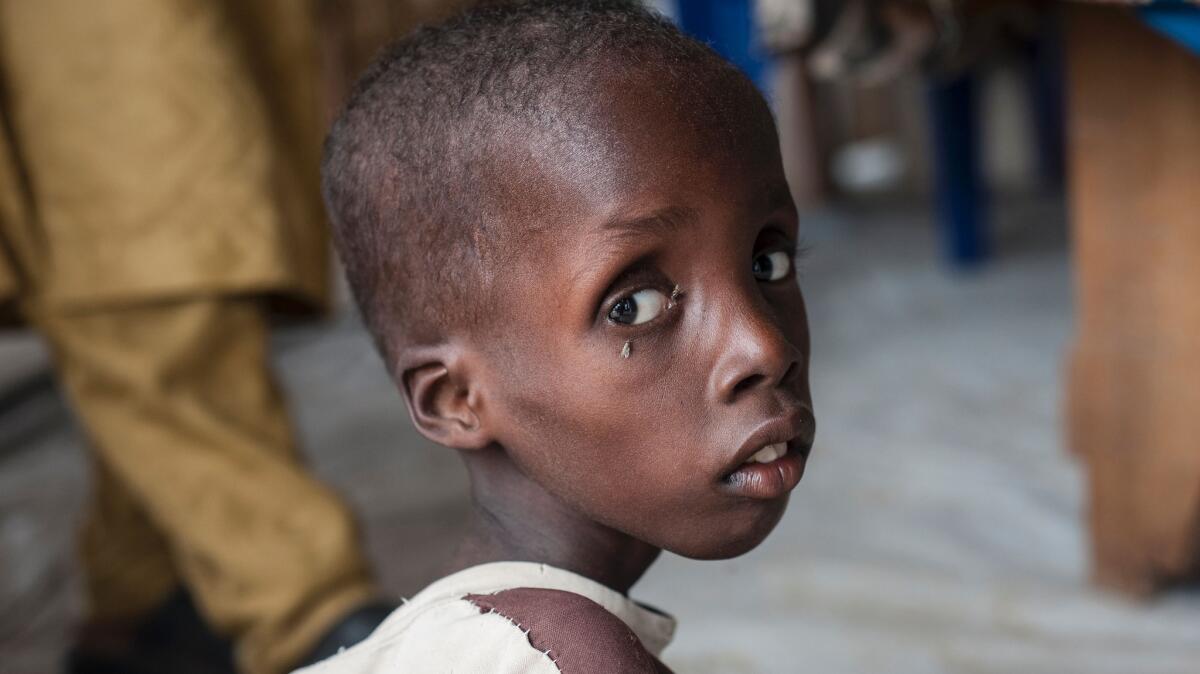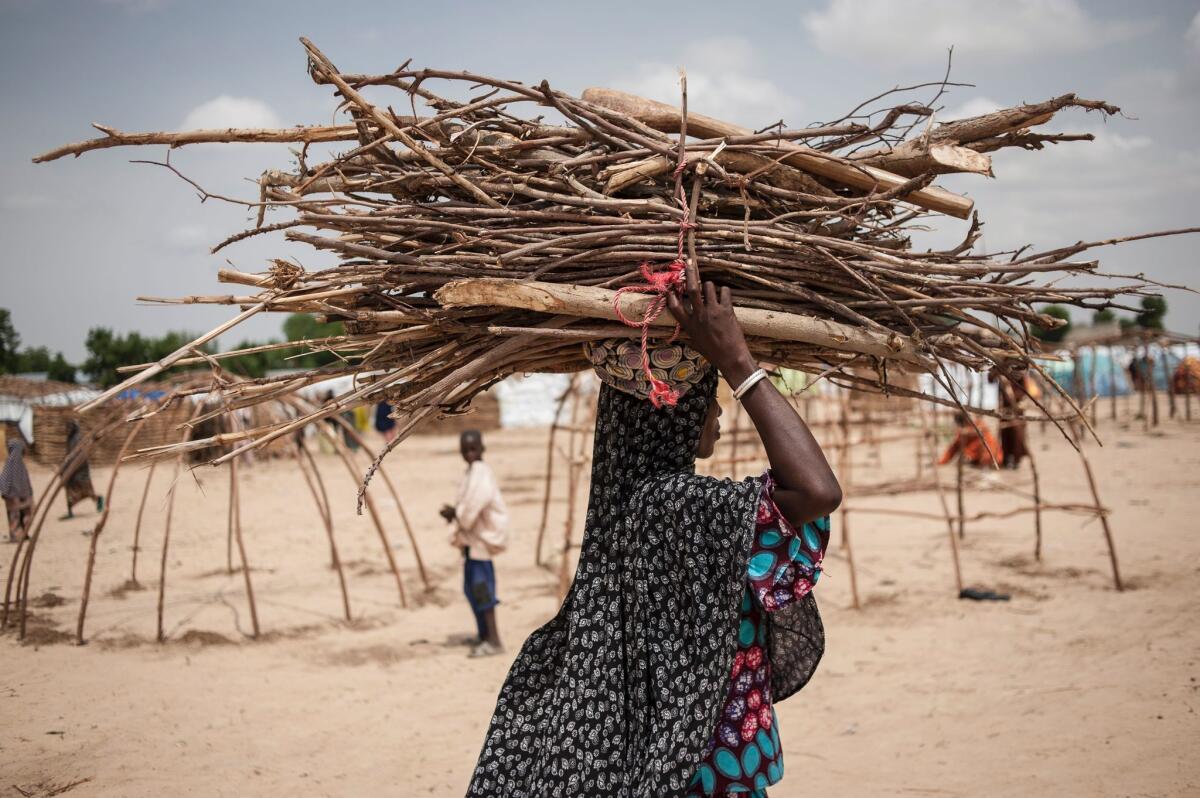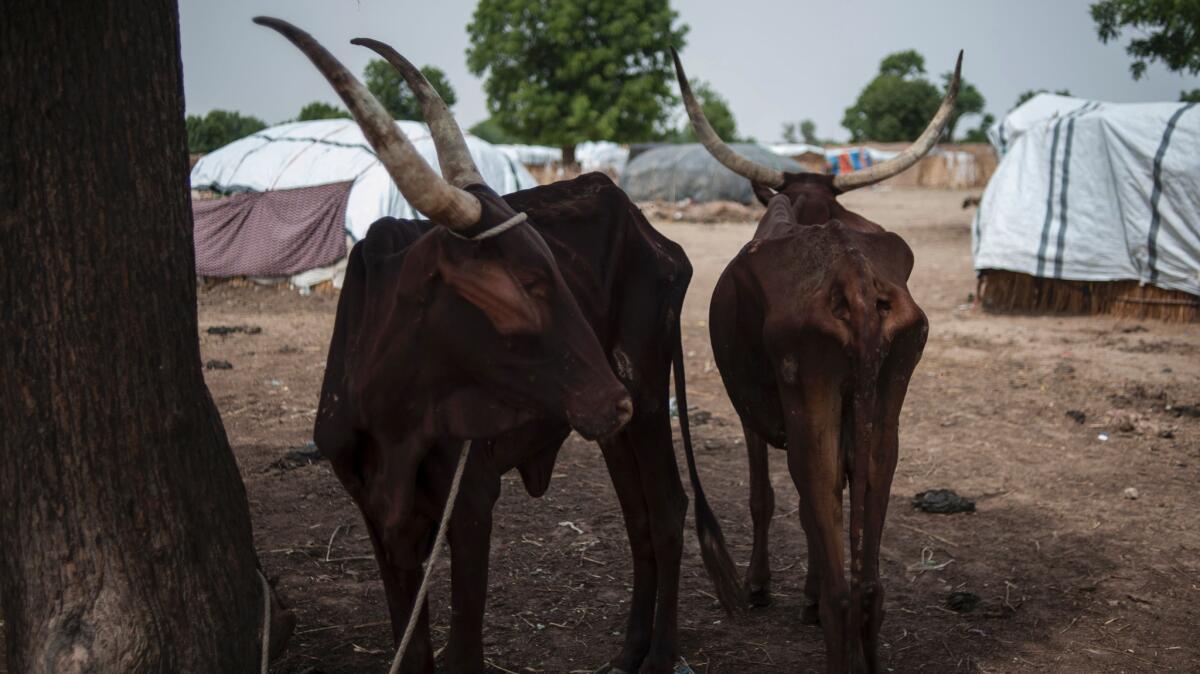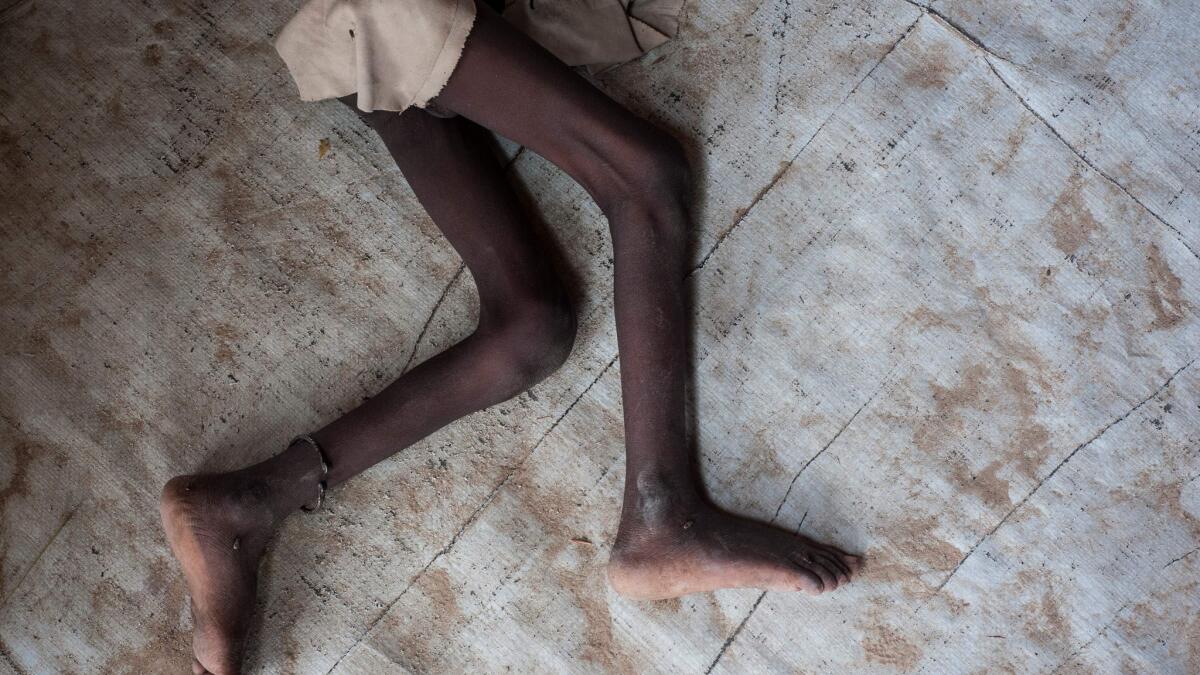Starving to death in Nigeria: Boko Haram is threatening the lives of thousands

- Share via
Reporting from Kano, Nigeria — The watermelons lay fat and green on Umar Bate’s farm, almost ready for harvest. He would need a tractor-trailer just to get his crop to market.
Musa Jabbi’s 400 cows wandered the plains, growing plump as they grazed. Abubakar Gamandi, a fisherman on Lake Chad, had smoked and stored a rich harvest of fish, ready to sell.
Then it all went wrong.
Northeastern Nigeria is now close to famine after nearly two years of brutal interference from Boko Haram, the Nigerian terrorist group that has systematically plundered and starved those who live here in a relentless scorched-earth campaign.

Nearly 50,000 children will die of starvation if they don’t get food soon and nearly 250,000 more are severely malnourished in Borno state, according to UNICEF. There are 4.4 million people affected by the crisis, half in areas inaccessible to humanitarian agencies.
The story of what happened to Bate, Jabbi and Gamandi and the others who helped feed those who live here is part of a wider mosaic of terror and deprivation in northeastern Nigeria, where 1.4 million people have fled their homes because of Boko Haram, the Islamic State affiliate in West Africa. The group is accused of kidnapping women and girls, sacking entire villages and slaying residents indiscriminately.
The land here is flat with scrubby trees; the towns ramshackle and dusty. Black plastic bags from local markets skitter across the landscape like alien tumbleweeds. But on the shores of Lake Chad the soil is so fertile and the underground water so abundant that farmers can irrigate and grow their crops year-round.
The region was once one of Nigeria’s breadbaskets, producing rice, maize, wheat, millet, sorghum, cowpeas, fruits, peppers, chilis and vegetables. Lake Chad’s fish were eagerly consumed by buyers in markets throughout the country.
We have nothing left
— Umar Bate, farmer
Umar Bate, who heads the farmers’ union in Doron Baga on Lake Chad, abandoned his watermelons early last year when Boko Haram attacked the town.
“We lost our farmlands and produce to Boko Haram and [were] reduced to a life of begging. We left our produce on the farm, in silos and stores in the market,” Bate said. “But all that is gone, we have nothing left.”
He now lives in a bleak camp for displaced people near Maiduguri, the Borno state capital. Bate said that when he fled, he left 30 tons of rice and nearly 18 tons of maize behind.
Boko Haram’s assault on Doron Baga, Baga and other nearby towns was staggering. Nobody stopped to count the bodies, but some estimates suggest that 2,000 people were killed. The two towns were nearly wiped from the map. Satellite images show 3,700 houses were destroyed.
Food supplies were looted, markets sacked, cattle stolen or killed, and farmers, fishers and herders driven away. All 280 rural food markets in Borno state were closed, according to Mohammed Rijiya, the president of the state chamber of commerce.

Bate said 250 of the 7,520 farmers in the Doron Baga farmers union have died in the past two years because of the deprivation inflicted by Boko Haram’s attacks.
Several months earlier, Gamandi said Boko Haram stopped a convoy of Lake Chad fishermen near Doron Baga, slitting their throats, tying them up and heaving their bodies into the water.
“The lake is now brimming with fish but we dare not go back and harvest it because of fear of Boko Haram attack,” said Gamandi, the fisherman who heads the Borno fishermen’s union.
“We were forced to flee the town to save our lives, leaving everything we owned. All our fishing equipment, such as fishing boats, nets and other accessories were lost to Boko Haram. I lost my house, my capital and stock of smoked fish. I now have to start from scratch.”
Musa Jabbi, the herder, has been left with just 52 of his 400 cattle. Like other herders, he is now camped with his cows on the outskirts of Maiduguri, but there is no food for his animals.
“Boko Haram have seized most of our herd and killed many of our people. They forcibly take our young boys and take them to Sambisa Forest, where they are recruited and turned into foot soldiers,” he said. “There is little grazing area left because Boko Haram has taken over the countryside. Any herder who ventures afield risks falling into the hands of Boko Haram who will kill him and seize his cattle.”
The Nigerian military has driven Boko Haram out of the major towns in the region, but rural areas and roads remain insecure.
Mustapha Adam of the Kukawa Development Assn., the umbrella union of 55 trade associations in Kukawa district, said the slayings of so many farmers and traders by Boko Haram would affect future agricultural production.
“The soil doesn’t require fertilizer. We farm throughout the year and grow natural produce. But we have been made weak, vulnerable and turned into beggars,” he lamented.
According to the Famine Early Warning Systems Network, or FEWSNET, Nigeria’s northeast faces one of the world’s most severe hunger emergencies, and the crisis is expected to continue.
After Boko Haram attacked a UNICEF convoy last month, the agency temporarily suspended humanitarian assistance to the region because of the risk to its own staff. But humanitarian deliveries have resumed.
Toby Fricker, spokesman for UNICEF, said that as Boko Haram has been driven out of areas of Borno and the northeast, humanitarian access has improved, but there are still 2.2 million people who are inaccessible to humanitarian aid workers, because of poor security.
“Security conditions do change on a daily basis, but we are reaching areas that were not accessible before and we are scaling up our response in Borno state,” said Toby Fricker, a UNICEF spokesman.
“As we reach these areas, the true extent of the humanitarian crisis is being revealed.”

Abubakar reported from Kano and Dixon from Johannesburg, South Africa.
Twitter: @RobynDixon_LAT
ALSO
A Hollywood-style celebrity scandal is dominating the Internet in China
A pariah no more, Myanmar is open for business — and corporate America is already in line
Despite relatively few terrorist attacks, Germany is gripped by fear and false alarms
More to Read
Sign up for Essential California
The most important California stories and recommendations in your inbox every morning.
You may occasionally receive promotional content from the Los Angeles Times.










